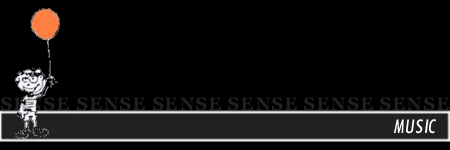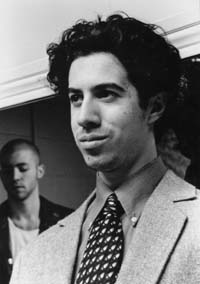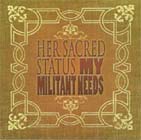|

"Looking
at each song right now on the album, and every one is dealing with
some sort of pain. There isnít one song on the album that is pain-free."
AN
INTERVIEW WITH RICHARD McGRAW
From
Sense #25, July 2002
| Richard
McGraw's songs stand as deeply detailed narratives of
painful memories, like long postcards from the past recalling
old dreams and wasted expectations. Like a Red House Painters
or a Trembling Blue Stars record, the stark sincerity
and the exhaustive study of all these emotions lay in
the center of McGraw's art, as he lets himself get carried
away in a maze of self-criticism and wistful looking back.
And it's more than clear that his songs are born by a
strong need of self-expression, giving the answer themselves
to the obvious question someone could ask a songwriter
"why do you write music?"... McGraw's lyrics read like
an anthology of random thoughts about human relationships,
full of tortured questions, guilt and moments of weakness.
Lyrics aside, the music follows a plain, acoustic style
that bears endless passion and emotive power, as it comes
with a lush orchestration featuring piano, accordeon and
violin. Then, there's also his unique voice, sometimes
hesitant, other times decisive, out to erase the painful
past - the only way being to dive deep into it. Below,
Richard himself talks about the album, his inspiration
and his music. |
|
 Q:
When and how did you start making music? Is "Her Sacred Status,
My Militant Needs" your first album? Q:
When and how did you start making music? Is "Her Sacred Status,
My Militant Needs" your first album?
Richard: "Her Sacred Status, My Militant Needs" is my first album.
I started making music at the age of fifteen I believe. I found
a guitar with a few strings on it in the basement. I had no idea
how to play it, but I managed to figure out a nice arrangement.
I remember feeling so proud of myself that I played it for a girl
I was courting at the time. Her name was Michelle. She was older
and more charismatic then I was. She was also very voluptuous and
sexual for her age. All this gave her a great sense of mystery.
And to deepen that mystery, she was attracted to me, a skinny fifteen-year-old
boy without a driverís license.
Q: What was the inspiration behind the album?
Why is it divided into four sections? Does it reflect four different
periods of songwriting?
Richard: The four sections donít reflect different periods of songwriting,
though I did consider doing that. The four sections represent different
themes, most of which are self-explanatory and should be read like
chapters in a book, and not as poetry or metaphor. The reason I
gave so much detail about Michelle, was because she was the first
woman to give me serious pain, the pains of love, insecurity, neglect,
lust, hurt etcÖ and these of love and adolescence inspired me to
write songs. So one could say that pain is the inspiration behind
the album. Iím looking at each song right now on the back of the
album, and every one is dealing with some sort of pain. There isnít
one song on the album that is "pain-free."
Q: How would you describe the album yourself?
Richard: That is a good question and a difficult one. How I describe
the album depends on whom Iím talking to. A quick and easy answer
is it has a Bob Dylan/Leonard Cohen/Nick Cave lyrical quality with
acoustic instrumentation similar to Jethro Tullís Aqualung or Neil
Youngís Harvest and my vocals are somewhere in between Cat Stevens
and Michael Penn. Iím never quite sure how to categorize the album.
It is singer-songwriter music, but itís not as naive and lighthearted
as Cat Stevens or James Taylor. And itís not as popular sounding
as Billy Joel or Elton John. My guess is that most Billy and Elton
fans would find my music a little too depressing or intellectual.
Billy Joel was a great songwriter and an innovator at one time,
now he writes a lot of bad stuff. I also donít like calling it folk,
because itís not really folk. Itís similar to Bob Dylanís folk,
without the politics. I sometimes call it modern folk so that I
can distinguish it from that 60ís activist self-righteous left-wing
political shit. I could call it "Emo-Folk", along the lines of Elliott
Smith, but I hate using words like "Emo." Emo suggests that the
artist treats his pain like a trademark or trophy. That to me is
bullshit. I donít want to be associated with the weak, whining,
depressed people of the world, and I donít want to capitalize off
some contrived image of the desperate artist.
Q: Tell us a few things about your label,
Non-Utopian Records.
Richard: The name "Non-Utopian Records" came to me after seeing
an interview with an economist. He said that socialist philosophies
and programs are Utopian based, that is, all of their programs are
aimed at making society more ideal. It then occurred to me that
"Non-Utopian is a good way to describe my label. I created my record
label to take responsibility for my music career. This is a daily
struggle of mine. It is very difficult to be successful as a singer-songwriter
with a limited budget and without a band. Itís a very daunting task.
Q: Was it difficult to record the album? Was
it self-financed? Are you satisfied with people's response to it
so far?
The process of making the album was very slow and costly. It took
over two years to complete. During that time I was a substitute
teacher, I went to Italy, and returned to college for one semester.
I always felt it needed more up-tempo songs, so I had to write more
material for it. After a semester of studying Italian I finished
"Judas Disguise" (the first song). I realized at that moment, I
had to complete the album. I quit school, lived at home and spent
most of my time, money and energy on it. It was self-financed, with
some help from my mother, grandmother , student loans, and credit
cards. It put me in debt for more than five thousand dollars. I
am satisfied with peopleís response to it. It is a very personal
and painful album, so I am pleased that it reaches so many people.
But Iím never really satisfied. I think if I sell thousands of copies,
then I will be truly satisfied. This is the kind of response I crave.
Q: Which artists or bands do you feel that
are similar in vein as you?
Richard: Leonard Cohen, Bob Dylan, Nick Cave, Elliot Smith, Tom
Waits, Fabrizio de Andre, Neil Young, John Cale, John Wesley Harding,
Will Oldham and Palace Music, Joni Mitchell, Amiee Mann, Donavan,
old R.E.M, old Bruce Springsteen, Cat Stevens, Bright Eyes, Belle
and Sebastian, Ben Harper, Jethro Tull, Michael Penn, Violent Femmes...
 Q:
Which is the most difficult part in your life as a musician? Which
is the most rewarding? Q:
Which is the most difficult part in your life as a musician? Which
is the most rewarding?
Richard: The most difficult part is making a living, surviving.
Because I donít make enough money from my music to live off of,
I have to make money some other way. No matter what occupation I
choose, it takes away from writing, performing and selling my music.
And I hate mindless menial tasks that donít use my potential. Most
musicians and actors can make a good living on being waiters. I
canít stand doing this work. And most of the people who run restaurants
are dicks. And what if I donít succeed as a musician? I donít want
to be 45 years old and serving people food. Iíve been studying graphic
design as a tolerable way to make a living, but it is hard work
and takes away from my music. The most rewarding aspect of being
a musician is the ability to move people and to experience their
responses. It is a great feeling to feel a genuine applaud from
an audience after singing a song I wrote. It is a great feeling
to hear that someone loves my album and considers it great.
Q: Do you enjoy playing live? Do you play
on your own or accompanied by fellow musicians?
Richard: I do enjoy playing live most of the time. If it is a good
place to play it is always rewarding. But if itís some dumb bar
where people are getting drunk and want to hear Lynard Skynard,
then I donít like playing live. Because I play on my own, this makes
it difficult. People like the energy and the rhythm of a band.
Q: What are your future recording plans?
Richard: Iím forming a band now, writing songs and promoting my
CD. I will gig with this band and continue to promote my music.
When Iíve sold a significant amount of CDs and I have enough money
to begin recording, (this might take a few years) I will start my
second album "The Truth About Lust."
Richard
McGraw's wonderful debut album "Her Sacred Status, My Militant Needs"
is available to mailorder from this website at the price of 7 euros
(including postage) - or 6 euros (including postage) if you live
in Greece.

|